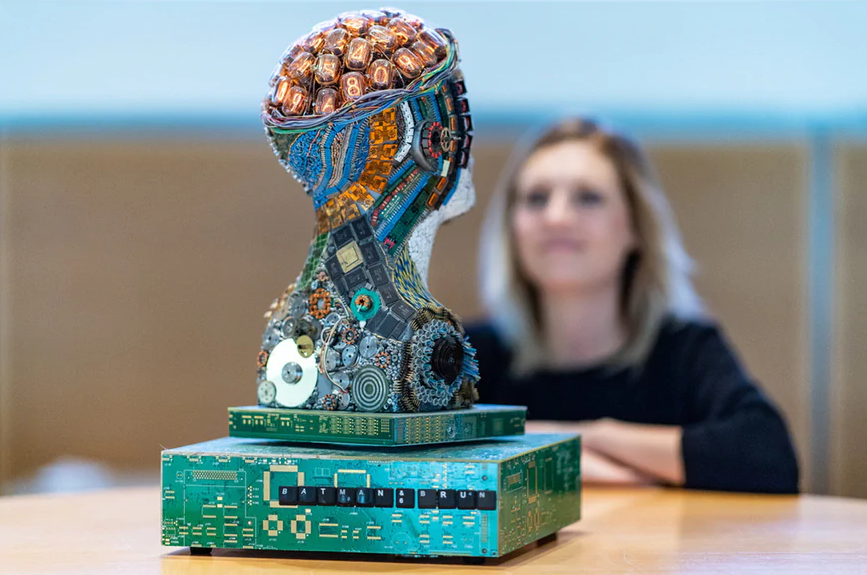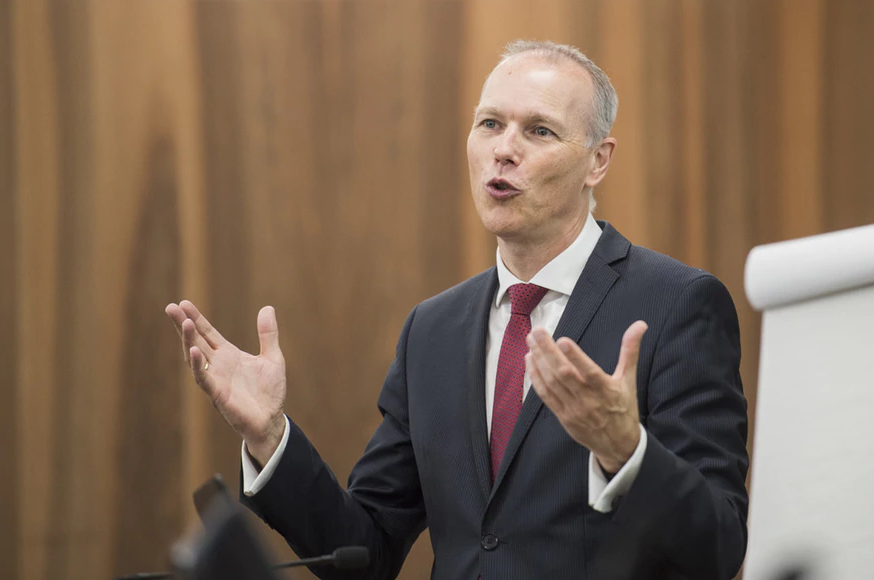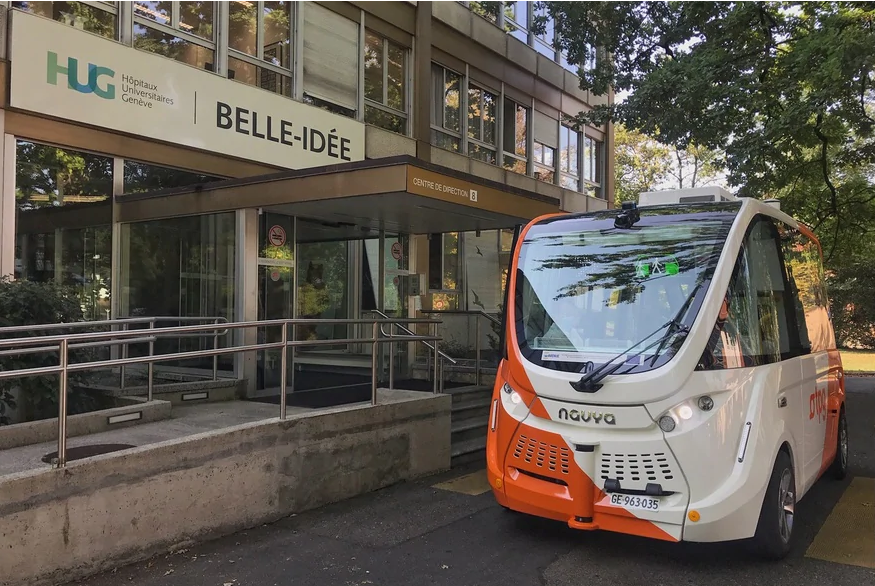A sculpture made from electronic components by the artist Muharrem Batman for the 2018 “Artificial Intelligence and Robotics” exhibition at the Heinz Nixdorf MuseumsForum, a computer museum in Paderborn, Germany. Keystone / Guido Kirchner Artificial intelligence (AI) is gaining ground in our societies, posing a threat to jobs and increasingly invading our private lives. A new centre for AI research at the federal technology institute ETH Zurich wants to put people at the centre of its work. Smart speakers, deepfake videos, personalised advertising –artificial intelligence is everywhere. Alexander Ilic, head of the new AI research centre at ETH Zurich, wants to make sure AI is there to help humans, not replace them. swissinfo.ch: AI increasingly influences our
Topics:
Swissinfo considers the following as important: 3.) Swiss Business and Economy, 3) Swiss Markets and News, Featured, newsletter, Sci & Tech, Sci & Tech
This could be interesting, too:
Nachrichten Ticker - www.finanzen.ch writes Die Performance der Kryptowährungen in KW 9: Das hat sich bei Bitcoin, Ether & Co. getan
Nachrichten Ticker - www.finanzen.ch writes Wer verbirgt sich hinter der Ethereum-Technologie?
Martin Hartmann writes Eine Analyse nach den Lehren von Milton Friedman
Marc Chandler writes March 2025 Monthly

A sculpture made from electronic components by the artist Muharrem Batman for the 2018 “Artificial Intelligence and Robotics” exhibition at the Heinz Nixdorf MuseumsForum, a computer museum in Paderborn, Germany. Keystone / Guido Kirchner
Artificial intelligence (AI) is gaining ground in our societies, posing a threat to jobs and increasingly invading our private lives. A new centre for AI research at the federal technology institute ETH Zurich wants to put people at the centre of its work.
Smart speakers, deepfake videos, personalised advertising –artificial intelligence is everywhere. Alexander Ilic, head of the new AI research centre at ETH Zurich, wants to make sure AI is there to help humans, not replace them.
swissinfo.ch: AI increasingly influences our lives. How important is it for society?
Alexander Ilic: Machines are more and more capable of doing things we thought only humans could do. At the moment, several new technologies are coming together and speeding up progress. ETH Zurich has been strong in AI research for several decades. What we need now is to organise a dialogue with society and business, and we need to do it responsibly.
swissinfo.ch: Have we reached a turning point?
A.I.: There are often technological advances that fuel each other. Mobile phones, for example, have changed our society forever. Some people say that in 20 years’ time, AI will be part of our lives like electricity has been since its invention. It will be hard to imagine what life used to be like without it.
New AI Research Centre
The new centre was launched in October with a core team of 29 professorships from seven departments. “We aim to have 100 professorships in the near future,“ director Alexander Illic told a press conference.
He said AI courses were increasingly popular at ETH. Students from different fields attend these courses, so uniting the different departments around AI makes sense.
The AI research centre aims to connect Europe’s leading AI hotspots and build bridges between fields of expertise, so that trustworthy, widely accessible and inclusive AI systems can be developed for society.
The centre is on the ETH compound, but is due to move to a more spacious location in Oerlikon near Zurich in 2022.
End of insertion
swissinfo.ch: There are already many institutes doing AI research, so was it necessary for ETH to create this centre?
A.I.: The special thing about our centre is that our work is interdisciplinary and transdisciplinary. It is not only about applying existing AI methods to complex social problems, such as climate change. Some problems require redefining the fundamentals of AI, and that is what we want to do.
swissinfo.ch: Can you elaborate on that?
A.I.: The areas of application where we want to bring about change and the fundamentals of AI should influence each other. In other words, the application changes the AI, and by changing the AI new fields of application arise. We want it to work both ways. In order to do this, we have set up this centre where various departments that used to be separate entities come together for dialogue. However, due to the Covid-19 pandemic we have not been able to meet as often as we would have liked. The centre is to become a central hub for ETH’s internal communication but also for external dialogue. Here, all departments and areas of operation come together and form a focal point for cooperation with the industry. The centre will also become an incubator for start-ups and support them in their development.
swissinfo.ch: While consumers are swamped with digital information and apps, it is hard for them to grasp the technology behind it and its purpose. How do you deal with this tension?
A.I.: We want to show in dialogue with the public what AI can achieve. There are many tangible examples, such as what is happening in medicine and digital health which is easy to understand and brings many positive changes. We want to show that artificial intelligence supports people, it does not replace them.
swissinfo.ch: Can you give an example of how you communicate with the public?
A.I.: We are planning a series of events on these issues. We want to show applications that already exist and also how they impact society. We have made it our mission to be a pioneer of trustworthy and inclusive AI. This means involving different population groups equally and respecting people’s individual rights. It’s also important to us that this core technology should be widely accessible. In a nutshell, trustworthy, inclusive and widely accessible. AI should not be only for large companies, it should also be available to small and medium-sized firms.
swissinfo.ch: You want to carry the digital transformation to society through human beings. Do you expect resistance from people?
A.I.: When something changes, there is always a certain amount of uncertainty and scepticism. It is important to understand that technological progress will change our society. We want to help shape this change and show that we at ETH Zurich are doing this in a responsible way. For example, we have a professor of ethics on our steering committee who makes sure our work is in line with the basic principles. When it comes to AI, it is particularly important to emphasize ethical work practices, which is best done by using examples.
swissinfo.ch: Which ethical questions will be dealt with at the new centre?
A.I.: The first question is whether we need new ethical fundamentals for AI, or not. Generally, most scientists in other departments of ETH Zurich already work following ethical principles. However, the questions around AI are a bit more complex, for example concerning algorithms. Are these algorithms fair? How can we judge that? Are they inclusive? These questions need a lot of clarification. There are currently scores of different guidelines. We need to be involved in the dialogue and provide clarity. We want to enter into dialogue with different groups, not only to discuss the issue but also to take a position.
swissinfo.ch: One such ethical question would be who should get access to certain AI technologies, such as military applications for example. To what extent will the centre address such questions and advise companies on how to assess and understand what their technologies are used for?
A.I.: Our main message is that technology is not simply neutral. The person who designs something new carries a certain responsibility. Hence, it is important to us that we help shape this dialogue and let our European values influence the development of AI applications.
swissinfo.ch: How will you deal with such ethical questions and dilemmas in the future?
A.I.: We want to set a good example, stand up for our values and culture and allow them to shape the development of our projects. This is a very effective method as we train people who live these values and take them with them when they go out into the world.
Translated from German by Billi Bierling
Tags: Featured,newsletter,Sci & Tech








